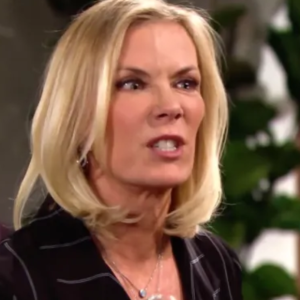In today’s exploration of daytime drama, we delve into the complex dynamics of relationships, freedom, and second chances, focusing
on the aftermath of Luna Noa’s recent pardon. This pivotal moment has liberated her from legal constraints, marking a fresh chapter
in her life. However, this newfound freedom carries significant responsibilities; Luna must navigate her post-pardon existence with
caution. The challenge lies in balancing her inclination toward scheming with the pressing necessity to avoid further legal entanglements. This delicate tightrope between reformation and her inherent nature provides a captivating psychological study of a character at a crossroads.
The transition from confinement to freedom often presents unexpected challenges. In Luna’s case, her time at the Spencer Mansion, though restrictive, allowed her feelings for Will Spencer to intensify in isolation. This one-sided emotional connection flourished amid the absence of actual interaction, allowing Luna to construct an idealized version of both Will and their potential relationship. This dynamic gives rise to a psychological exploration of obsession—a phenomenon that transforms a simple crush into something more profound and potentially concerning.
During her time at the Spencer Mansion, Luna’s fascination with Will evolved significantly. The circumstances forced her into the shadows whenever he was present, resulting in a peculiar dynamic where she could observe him without being seen in return. This one-way interaction fostered an unhealthy attachment pattern, as evidenced by Luna’s habit of gazing at Will’s framed photographs. These moments of private admiration acted as substitutes for genuine connection, allowing her imagination to fill in the voids of Will’s personality and their compatibility.
Psychologically, this unhealthy attachment can be classified as a parasocial relationship—one where Luna has formed strong emotional bonds without the reality check of actual interaction. The months spent cultivating this obsession have led Luna to craft a narrative in her mind that justifies her belief that she and Will are destined to be together, despite minimal direct contact. This disconnect between fantasy and reality sets the stage for potentially problematic behaviors, particularly now that her physical freedom allows her to act on these desires.

Luna’s path to winning Will’s affections will not be easy. The first major hurdle she faces is Will’s unfavorable perception of her, which requires substantial effort and genuine transformation—qualities that may conflict with her scheming nature. The second obstacle is the existing emotional relationship between Will and Electra Forester, another formidable barrier that will complicate Luna’s aspirations. As she navigates these challenges, Luna may consider strategic alliances, such as a potential partnership with Dario Remy Price, to further her agenda by appealing to Remy’s interests regarding Electra.
Throughout her storyline, Luna’s character has consistently exhibited remarkable determination, allowing her to overcome numerous obstacles in the past. This persistence suggests that her current ambitions should not be underestimated. The reinforcement of her self-belief following her pardon may create an inflated sense of capability, leading her to pursue even bolder actions. The psychological impact of achieving freedom after significant consequences cannot be ignored, as it might fuel Luna’s conviction that she can bend circumstances to her will, regardless of the risks.
As Luna formulates her strategy to win Will’s heart, she likely envisions a future where she successfully replaces Electra. While these fantasies serve as motivation, they also obscure the practical challenges she faces. The crucial question remains whether Luna’s determination will be enough to overcome the genuine connection that exists between Will and Electra. While her persistence and cunning are considerable strengths, the resilient foundation of Will and Electra’s relationship might prove more robust than Luna anticipates.





